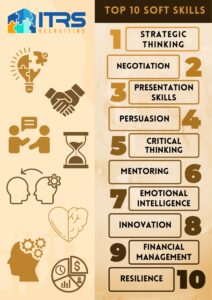Level up your résumé with the most in-demand soft skills for 2024
Do you know the difference between “hard” and “soft” skills?
When you’re filling out your résumé, it’s a good idea to have a combination of both to appeal to recruiters and hiring managers. Your hard skills are specific, job-related credentials that you’ve built up through training, education and professional development. Maybe you excel at editing images in Photoshop or have SEO knowledge that’s invaluable to companies looking to grow their brands. These hard skills take time to gain and require continuous practice to maintain.
But don’t lose sight of your soft skills. Also referred to as power skills, these are talents that are applicable to any workplace, making them highly transferable across different industries.
Forbes contributor Rachel Wells looked into a recent analysis from CashNet USA of more than 17 million job postings on Indeed, which identified the soft skills that were of greatest importance for jobs in the United States. Take a look at the skills below and consider whether any of them make sense to add to your résumé.
-
Strategic Thinking:
Identified as the most in-demand soft skill in listings for high-paying jobs, strategy skills—being able to analyze a situation and set goals—are an important quality for leaders and aspiring leaders.
-
Negotiation:
Put these skills on display during the interview process, and prove that you would be comfortable negotiating business contracts, handling sensitive situations at work and more.
-
Presentation Skills:
Being able to present in an engaging and concise manner is especially important as more meetings take place on Zoom, where attention spans can be a bit shorter for those watching.
-
Persuasion:
Persuasion is a form of communication skills, and can often be confused with negotiation tactics, but there is a clear difference. While negotiation works for the aim of enabling both parties to reach an agreed outcome through mutual compromise, persuasion is useful to get the other party to agree on your side. However, both skills work hand in hand.
-
Critical Thinking:
Critical thinking is a major component of strategy and decision-making. To think critically, you need to carefully gather and analyze facts and use your observations to make a sound judgment. While this is obviously an essential quality for leaders and managers, there will be situations at work when you will be required to think critically in an emergency or where you are granted more autonomy over your work, and these skills will necessarily come into play. This demonstrates responsibility and ownership, and self-awareness to be accountable for your actions.
-
Mentoring:
Mentorship is a critical part of developing and demonstrating your competence for management and leadership roles. Furthermore it demonstrates teamwork and collaboration, and improves other skills such as patience and communication, as you train and mentor others.
-
Emotional Intelligence (EQ):
Emotional intelligence is defined as the ability to understand and regulate one’s own emotions and to relate to those of others. It is evident based on the World Economic Forum’s report that soft skills related to emotional intelligence are seen as highly desirable by employers.
Some key indicators that you have high emotional intelligence include how well you actively listen and demonstrate empathy, how you respond and react to challenges, how you view failure, and your perspective on your professional growth and development. -
Innovation:
Do you consider yourself to be an innovative or creative thinker? Even if you feel that you don’t have anything unique or value to bring to the table, aim to stretch yourself every day by considering various approaches and always challenging assumptions and the status quo. Not because something has always been done a certain way does it mean that it can be rendered effective. Do brainstorming exercises on your own and with your team, and view a business problem or problems at work from every possible angle, carefully evaluating pros and cons. You can stretch your imagination by constantly asking yourself, What else?, even if your ideas may look outrageously silly at first.
- Financial Management: You don’t need to work in the finance department of your organization to need to have a good grip of the finances. Undertake training, and where possible, learn from your company’s financial team so that you can understand what goes into the financials, and what part you play in helping to cut down unnecessary expenses. Learn basic business finance terminology. This will work in your favor should you pursue a promotion.
- Resilience: Resilience is a trait demonstrated by those who have high levels of emotional intelligence. Being resilient means that you view failures and setbacks with new eyes. Instead of quitting or blaming external factors, you undertake a period of self-reflection, critically analyze the situation, and get back up again to try something new, using the lessons learned.
When you have these 10 soft skills, you will be empowered to make the best decisions for your organization and for your career, and will be more in-demand with career and business opportunities flooding your way.

